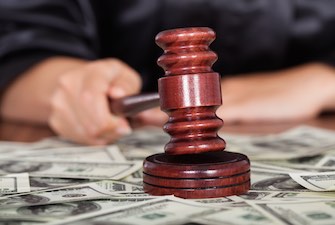 Patent practitioners, and many in-house counsel, are all too familiar with “patent trolls,” non-practicing entities that, as a business model, acquire patents and sue established companies for nuisance value settlements. Indeed, the proliferation of troll suits reached such a fever pitch in recent years that it garnered the attention of the media, industry groups, and Congress. (Both the House and Senate proposed bills designed to address the problem).
Patent practitioners, and many in-house counsel, are all too familiar with “patent trolls,” non-practicing entities that, as a business model, acquire patents and sue established companies for nuisance value settlements. Indeed, the proliferation of troll suits reached such a fever pitch in recent years that it garnered the attention of the media, industry groups, and Congress. (Both the House and Senate proposed bills designed to address the problem).
Then in April 2014, the United States Supreme Court decided Octane, forever altering the landscape of patent litigation. Octane Fitness LLC v. ICON Health & Fitness, Inc., 134 S. Ct. 1749 (Apr. 29, 2014). In Octane, the Supreme Court redefined what it means to be an “exceptional” case for purposes of patent fee shifting of attorney’s fees in patent cases. Patent trolls create economic leverage over even the largest companies in the country (Apple, Microsoft, Google) by taking old patents, with outdated technology, but broadly worded patent claims, and then filing dozens of patent suits at once. By doing so, the incremental cost to litigate beyond the first defendant is negligible, i.e., once the patent analysis and related litigation work are performed for the first case, the work for additional cases is mostly duplicative and costs very little. The economies of scale in this arrangement provide patent trolls with economic advantage over each defendant, which must defend at its own expense.
Before Octane the Federal Circuit required a showing, by clear and convincing evidence, that the patentee’s case was brought in subjective bad faith and was objectively baseless, before fees could be awarded to a prevailing accused infringer. Under this standard there was no realistic chance to get attorneys’ fees even in the weakest of patent cases. As a result, patent trolls could extract monies from any defendant, no matter the economic worth of the patent, because a $500,000 settlement, for example, was cheaper than $3,000,000 to defend a weak patent case. Without any realistic chance of getting fees back for successfully defending a weak case, companies were economically coerced to pay the nuisance value settlements.
The Supreme Court, in Octane, rejected the Federal Circuit’s “rigid” test and heightened proof standard, holding a case is “exceptional” for purposes of 35 U.S.C.§ 285 if, by a preponderance of the evidence, it “stands out” from others with respect to the substantive strength of the party’s position or the unreasonable manner of litigating. In doing so, the Supreme Court provided economic incentive for companies to stand up to the patent trolls by defending weak patent cases. District courts have followed the Supreme Court’s lead, awarding attorneys’ fees in dozens of cases in the last year since the Octane decision, and ultimately, it is hoped, curbing abusive and unmeritorious troll litigation. See, e.g., Summit Data Sys., LLC v. EMC Corp, 2014 WL 4955689 (D. Del. Sept. 25, 2014).
What may be less well known is that Octane was not itself a “patent troll” case. Rather, Octane involved another kind of abusive patent litigation; namely, a large company asserting a patent it pulled “off the shelf” against a small start-up competitor. While patent trolls gain economic advantage through economies of scale, large companies have economic advantages over smaller competitors by virtue of their size and resources, and can similarly abuse the system. They can use the high cost to defend patent litigation as a competitive weapon, either to force the smaller competitor to exit the market, discontinue a product line, or pay an unwarranted royalty (thereby hindering the competitor in the marketplace). On remand, the District Court in the Octane case recognized just this sort of economic coercion, and found the case exceptional warranting a fee award. Icon Health & Fitness, Inc. v. Octane Fitness, LLC, 2015 WL 4041684 (D. Minn. July 1, 2015). And last week, the District Court awarded almost $2 million in fees and costs to Octane, the prevailing accused infringer. Icon v. Octane, 2015 WL 5122905 (D. Minn. Sept. 1, 2015).
So, what is the best way to use the Octane decision and how do you best maximize your odds of securing a fee award for standing up to the abusive patent litigation; either patent troll or competitor bully? Consider these general guidelines:
- Early Notification Letter. Upon being sued for patent infringement and realizing the claims are weak, begin making your record for patent fees. Do not wait until the end of the case to start thinking about the facts that support a fee award. As soon as you diagnose the case as weak, put your opponent on notice with a detailed explanation, in a confidential, Fed. R. Evid. 408 communication. If you prevail, this letter could be the starting point for seeking full fees, as it removes any argument by your opponent that they did not fully appreciate the weakness of their case. This is also a good opportunity to clear up any misconceptions about how your product operates or is constructed at the front end of the litigation.
- Make the Record for Economic Coercion. The Supreme Court has expressly recognized the potential for economic abuse in patent litigation. See Blonder-Tongue Labs., Inc. v. Univ. of Illinois Found., 91 S. Ct. 1434, 1452 (1971). District courts have expressly cited economic abuse as one factor for awarding fees. Eon-Net v. Flagstar Bancorp (Federal Circuit 2011) (awarding fees under the pre-Octane standard in part because “the record supports the district court’s finding that [plaintiff] acted in bad faith by exploiting the high cost to defend complex litigation to extract a nuisance value settlement from [defendant]”); Lumen View Tech., LLC v. Findthebest.com, Inc., 24 F.Supp.3d 329, 336 (S.D.N.Y. 2014) (“[plaintiff’s] motivation in this litigation was to extract a nuisance settlement from [defendant] on importance of incentivizing challenges to a patent’s validity or scope). This is not surprising. No one likes a bully and when you can prove that to a district court, it helps improve the odds of your fee submission.
Fully discover every aspect of the plan that gave rise to the litigation and the execution of that plan. In the context of troll litigation, this would include the investors funding the litigation, their history with suits of this nature, how they found the patents in suit, and how they selected their targets, and resolved other cases.
In the context of competitor litigation, fully develop the story regarding a larger, more established company suing a smaller, more vulnerable company, and the use of questionable patent claims to get some remedy to which the company was not reasonably entitled, for example, stopping competition or paying a royalty not owed. See Medtronic, Inc. v. Mirowski Family Ventures, LLC, 134 S. Ct. 843, 852 (2014) (“A patentee ‘should not be … allowed to exact royalties for the use of an idea … that is beyond the scope of the patent monopoly granted’.”)
- Make a Record of Aggressive Litigation Conduct. One of the more important, yet overlooked, aspects of the Octane decision is the Court’s holding as it applies to litigation misconduct. While not necessary to a fee award, if you can show that your opponent’s case is not only weak, but that they also used unreasonably aggressive litigation tactics to bully you, i.e., make the litigation even more unbearable, it will improve the odds of a fee award. Importantly, no conduct in the litigation need rise to a level that is independently sanctionable under Rule 11. Octane Fitness, 134 S. Ct. at 1756-57. This is key. Most lawyers are smart enough not to violate Rule 11. Here, you are only attempting to prove an overall course of unreasonably aggressive conduct that was intended to drive up the cost of litigation or make it needlessly difficult. This, for example, could include picking an inconvenient forum. See, e.g., Noxell Corp. v. Firehouse No. 1 Bar–B–Que Restaurant, 771 F.2d 521, 526 (D.C. Cir. 1985) (R.B. Ginsburg, J., joined by Scalia, J.). It could be overly aggressive or unreasonably broad discovery demands. Your outside counsel should keep track of and properly paper this trail for later use.
- Section 285 Awards Are Remedial, Not Punitive; Your Opponent Does Not Have to Be Bad. It is easy to fall into the trap of trying to prove your opponent is a bad guy. While any such evidence is helpful, remind the district court that Section 285 awards are remedial, not punitive. Kilopass Technology, Inc. v. Sidense Corp., 738 F.3d 1302 (Fed. Cir. 2013). Judges are reluctant to punish litigants or their counsel. Shifting fees does not, after Octane, require the court to find that the patentee acted in bad faith or brought a case that violated the frivolousness standard of Rule 11. The Court need only find that the case was weak enough that it stands out from the normal patent case. It is shifting fees to make the accused infringer whole, not punish “bad” parties or their counsel. This notion is much more palatable to judges.

![[IPWatchdog Logo]](https://ipwatchdog.com/wp-content/themes/IPWatchdog%20-%202023/assets/images/temp/logo-small@2x.png)


![[Advertisement]](https://ipwatchdog.com/wp-content/uploads/2024/04/Artificial-Intelligence-2024-REPLAY-sidebar-700x500-corrected.jpg)
![[Advertisement]](https://ipwatchdog.com/wp-content/uploads/2024/04/Patent-Litigation-Masters-2024-sidebar-700x500-1.jpg)

![[Advertisement]](https://ipwatchdog.com/wp-content/uploads/2021/12/WEBINAR-336-x-280-px.png)
![[Advertisement]](https://ipwatchdog.com/wp-content/uploads/2021/12/2021-Patent-Practice-on-Demand-recorded-Feb-2021-336-x-280.jpg)
![[Advertisement]](https://ipwatchdog.com/wp-content/uploads/2021/12/Ad-4-The-Invent-Patent-System™.png)






Join the Discussion
4 comments so far.
Ron Osborne
September 18, 2015 11:04 amThe lesson for the smaller companies and startups is to either reserve for litigation expenses during funding, or arm themselves with intellectual property insurance. There is insurance for both enforcement of IP rights, and defense against these suits. The insurance levels the playing field for smaller companies, and allows them to stay in the fight without going bankrupt and for the case to be decided on the merits. In her decision on fees in the Octane case, Judge Montgomery specifically noted that Octane was assisted by its patent insurance partner Intellectual Property Insurance Services Corporation.
Jerome Phillips
September 18, 2015 09:37 amAnd big companies can be abusive by ignoring the valid patent rights of little guys.
Brad Salai
September 17, 2015 08:45 amI think the lesson is something I asked “enthusiastic” clients from time to time when appropriate, “Can you afford to win this?”
Or as in War Games, “The only way to win is not to play the game.”
But seriously, I think much of the problem with addressing the troll problem is looking at the entities, not the behavior. As Rudy Teschler pointed out, big companies can be trolls too, it isn’t the actor, its the behavior that abuses the system, and I think Octane gives the courts what they need to discourage troll like behavior, that is, overly aggressive assertion of patents of questionable validity, and questionable scope vis-a-vis the purported infringement, I would suggest that a PAE that has a good case and litigates fairly, should not be punished, and that an operating company that doesn’t, should. Octane lets that happen.
Edward Heller
September 17, 2015 05:49 amIBM v. Conner. Multiple patents on both sides. Valid patents. Good case for infringement. Litigated to the hilt, by both sides.
But the litigation expenses “broke” Conner as a company and it soon ceased to exist. IBM? Perhaps no more than an nuisance.
What is the lesson here?